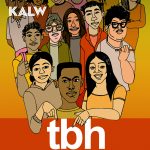TBH, When San Quentin Managers Say KALW’s Audio Academy Work is Good, It’s Really Good
By Ben Trefny, News Director, KALW, Audience Supported Public Radio and Imran Ali Malik, Audio Academy ‘20
We got some really nice news this week regarding our education reporter (and Audio Academy mentor) Lee Romney. The Northern CA Branch of the International Dyslexia Association is honoring her for her outstanding role in education and social justice. Lee will be one of this year’s award recipients, in particular for her series “Learning While Black: The Fight For Equality in San Francisco Schools”.
Congrats, Lee!
Meanwhile, the Community Relations Managers (CRMs) at the two prisons where KALW teaches journalism to incarcerated people reviewed our programs. They gave us the highest possible ratings in all categories. The San Quentin CRM said, “KALW has provided consistency, and they have been a true partner with this institution,” adding, “They are well-organized and have provided a structured program, as intended.”
 Have you heard Uncuffed, the podcast made by the 12 men we work with at San Quentin and Solano State Prisons? If not, check it out, and get a sense of the humanity people share inside the walls.
Have you heard Uncuffed, the podcast made by the 12 men we work with at San Quentin and Solano State Prisons? If not, check it out, and get a sense of the humanity people share inside the walls.
 We’re increasingly reimagining the work our news department training programs produce as podcasts. The latest example is actually launching on Monday. It’s a podcast by, for, and about teenagers, and it’s called tbh. (That means “to be honest,” in case you’re not big into texting or social media.) The podcast is hosted by Oakland Youth Poet Laureate and Oakland Technical High School senior Samuel Getachew and features stories produced by trainees in our summer high school training programs. They hail from schools all over the Bay Area, from Oakland to San Francisco to San Jose, and even one from rural Pennsylvania! It’s the culmination of work we’ve invested in for 15 years now, helping to educate teenagers in week-long on-site workshops and in summer-long training intensives. Now we’ve got them spreading their perspectives in their own voices, and we hope the podcast is a big hit!
We’re increasingly reimagining the work our news department training programs produce as podcasts. The latest example is actually launching on Monday. It’s a podcast by, for, and about teenagers, and it’s called tbh. (That means “to be honest,” in case you’re not big into texting or social media.) The podcast is hosted by Oakland Youth Poet Laureate and Oakland Technical High School senior Samuel Getachew and features stories produced by trainees in our summer high school training programs. They hail from schools all over the Bay Area, from Oakland to San Francisco to San Jose, and even one from rural Pennsylvania! It’s the culmination of work we’ve invested in for 15 years now, helping to educate teenagers in week-long on-site workshops and in summer-long training intensives. Now we’ve got them spreading their perspectives in their own voices, and we hope the podcast is a big hit!
In case you can’t tell, I’m really excited about it, and you should be, too. Subscribe right here and spread the word!
My inspiration to write this blog post about celebrated projects stems from accolades earned by one person in our Audio Academy. Imran Ali Malik makes the podcast American Submitter about Muslims in the West and the spiritual teachings of Islam. The Bello Collective recognized one of its episodes as being among the top 100 in any podcast of 2019. It’s about Imran’s immediate family and the choices they make in raising their child. As a parent, myself, I relate deeply. This is beautiful, intimate work.
Imran has some thoughts to share this week about his experience as part of the Audio Academy. Here they are:
I first discovered narrative storytelling podcasts at a time of great transition in my life. I had never before appreciated power of the real human voice that tells a story of something that really happened to them, something that they really felt. What I fell in love with was the art of it—light on images but suffused with the human voice and heart. How it demands the focus and imagination of its listeners. When I was introduced to rock music as a teenager, it wasn’t long after that I got a guitar and spent all day teaching myself how to play. Over a decade later, I fell in love again, and I had to learn how to create and participate in this magic.
The Audio Academy is a rare chance to be initiated into this craft—a rare kind of craft that engages so much of your mind and spirit. We’re about halfway through the program. In a few short months I’ve learned a lot about ProTools from KALW’s excellent engineers. I’ve been mentored by a seasoned journalist who has shown me how to be tenacious and determined in getting sources for my reporting. I’ve learned how a newsroom and production team functions to produce a show that airs multiple times a week. But more than anything, I’ve been encouraged and emboldened to listen to my own curiosity, to use my own mind and voice to narrate the things that I see in the world, and to use that mind and voice to help others to hear what I have heard, and to see things as I have seen them. For that and other lessons, for the camaraderie, and for the initiation into a field that engages so much of the heart, I feel an enormous amount of gratitude to those who make my presence in this program possible.

